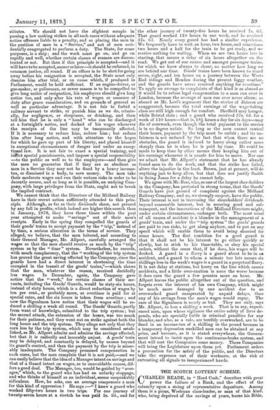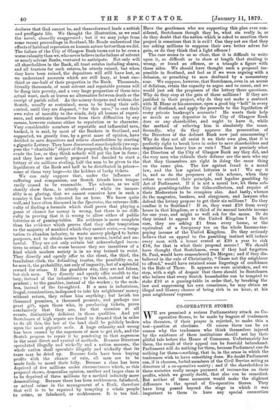'DHE SCOTCH LOTTERY SCHEME.
CHARLES READE, in " Hard Cash," describes with great power the failure of a Bank, and the effect of the calamity upon a string of representative depositors. Among them is a pious, Wesleyan class-leader, or man of that kind, who, being deprived of the savings of years, burns his Bible, shortly show them, is utterly absurd ; while its immor- stitute gambling-tables for tithe-collectors, and require of ality is so glaring, that we cannot conceive how in such a their Moderators to be croupiers also. And lastly, whence country it has been tolerated for an hour. We know quite do the magnates, bankers, and clergymen, and lawyers who well, and have often discussed in the Spectator, the extreme diffi- defend the lottery propose to get their six millions ? Do they culty of finding a formula which shall prove that playing a confine it to Scotland ? If so, they want £10 from every game of chance for money is wrong, but there is no diffi- house in that kingdom, or a third of its annual taxable income culty in proving that it is wrong to allow either of public for one year, and might as well ask for the moon. Or do lotteries or of gaming-tables. No evidence is more complete they intend to appeal to the United Kingdom In that than the evidence which proves that they offer temptation case, they are asking £1 from every house, or the to the majority of mankind which they cannot resist,—a temp-. equivalent of a fourpenny tax on the whole Income-tax- tation to abandon industry, to waste money pledged to better paying income of the United Kingdom. Do they seriously purposes, and to obtain money by any means, lawful and un- believe that an appeal to the gambling instinct will induce lawful. They are not only certain but acknowledged incen- every man with a house rented at £20 a year to risk tives to crime, all the worse because they are incentives of a £10, for that is what their proposal means ? We should kind which modern society is in no way trained to resist. have thought that Scotchmen, even if they had forgotten They directly and openly offer to the cheat, the thief, the St. Paul, would have remembered De Morgan; and if they dis- fraudulent clerk, the defaulting trustee, the possibility or, as believed in the rule of Christianity, " Cause not thy neighbour he sees it, the probability, not only of impunity, but of a splendid to offend," would have retained some lingerings of confidence reward for crime. If the gamblers win, they are not felons, in the Rule of Three. It appears we were mistaken, and we but rich men. They directly and openly offer wealth to the stop, with a sigh of despair that there should be Scotchmen lazy, instead of the industrious ; to the rash, instead of the who believe that every Scotch householder can be tempted to prudent ; to the gambler, instead of the worker ; to the reek- stake f10 at a gaming-table in order that, by breaking the less, instead of the far-sighted. If a man is industrious, law and suppressing his own conscience, he may obtain an frugal, conscientious, indisposed to take his neighbours' money illegal and illusory chance of being rich in an hour, at his without return, they refuse him anything ; but lavish ten poor neighbours' expense. thousand promises, a thousand presents, and perhaps one great gift, upon those who, in purchasing tickets, prove conclusively that they are, for that occasion at all CO-OPERATIVE STORES. events, distinctively deficient in those qualities. And yet 'AVE are promised a serious Parliamentary attack on Co- Scotchmen of high repute are found to demand that in order operative Stores, to be made by leagues of tradesmen to do all this, the law of the land shall be publicly broken who threaten, if their prayer is rejected, to make this a upon the most gigantic scale. A huge calamity and wrong test-question at elections. Of course there can be no has been caused by the eagerness of men to get rich, and the reason why the tradesmen who think themselves injured Scotch propose to repair it by pandering to that eagerness by the existence of these institutions should not lay their in the most direct and cynical of methods. Because Directors pitiful tale before the House of Commons. Unfortunately for speculated illegally and wickedly and a nation mourns, the them, the result of their appeal can be foretold beforehand. whole nation shall speculate illegally and wickedly that its Parliament will do nothing for them, because Parliament can do tears may be dried up. Because fools have been buying nothing for them—nothing, that is, in the sense in which the profits with the chance of ruin, all men are to be tradesmen wish to have something done. No doubt Parliament made fools to mend their folly. Because a class has been can, if it chooses, forbid members of the Civil Service acting as deprived of five millions under circumstances which, as this directors of a co-operative society ; and if the shareholders in proposal shows, demoralise opinion, another and larger class is these societies really escape payment of income-tax on their to be deprived of three millions by a method infinitely more profits, which we greatly doubt, that also can be remedied. demoralising. Because there has been recklessness, falsehood, But neither of these measures would make the slightest or actual crime in the management of a Bank, therefore difference to the spread of Co-operative Stores. They that evil is to be repaired by tempting a whole people have long passed beyond the stage in which it was to crime, or falsehood, or recklessness. It is too bad. important to them to have any special connection declares that God cannot be, and thenceforward leads a sottish Have the gentlemen who are supporting this plan ever con- and profligate life. We thought the illustration, as we read sidered, Scotchmen though they be, what sin really is, or the novel, absurdly exaggerated ; but if we may judge from do they doubt that the nation which is asked to sanction their some recent proceedings in Scotland, Mr. Reade understood the project is conscious that it is evil ? Can they not see that they effects of habitual repression on human nature better than we did. are asking millions to suppress their own better selves for The failure of the City of Glasgow Bank turns out to be even a gain, or do they think that a light offence / worse calamity than we, who never believe in the failure of solvent The case seems to us so clear, that it is difficult to write or nearly solvent Banks, ventured to anticipate. Not only will upon it, as difficult as to show at length that stealing is all shareholders in the Bank, all trust estates including shares, wrong, or fraud an offence, or a triangle a figure with and all trustees for such estates, be utterly ruined, but when three sides. We should have thought such a proposal im- they have been ruined, the depositors will still have lost, as possible in Scotland, and feel as if we were arguing with a we understand accounts which are still hazy, at least one- delusion, or preaching to men deafened by a momentary third or one-half of their properties in the Bank. Thousands, roar. We suppose, however, that Scotchmen, even in an access literally thousands, of most solvent and reputable persons will of delirium, retain the capacity to argue and to count, and we be flung into poverty, and a very large proportion of them into would just ask the proposers of the lottery three questions. actual want, such as leaves no alternative between death or the Why do they stop at the gain of three millions ? If they are receipt of parish relief. As the nasery deepens and widens, the justified in their project, why do they not make a contract Scotch, usually so restrained, seem to be losing their self- with M. Blanc or his successor, open a good big " hell" in every control, until they are disposed, " for this once," to cast their City of Scotland, and apply the proceeds to the liquidation of own rules of morality to the winds, defy all lessons of experi- every private bankrupt's accounts ? He wants their help ence, and extricate themselves from their difficulties by any as much as any depositor in the City of Glasgow Bank means, however ruinous either to reputation or to character. does or any shareholder, and ought to have it, while Very considerable numbers of reputable and influential men, the method of relieving him is absolutely the same. backed, it is said, by most of the Bankers in Scotland, and Secondly, why do they approve the prosecution of supported, we greatly fear, by a great mass of opinion, have the Directors of the defunct Bank now just commencing ? decided to save depositors and relieve shareholders by starting Why do they not all resist it on their own plea, that it is a gigantic Lottery. They have discovered someloophole (we sup- perfectly right to break laws in order to save shareholders and pose the " charitable" object of the proposal), by which they can depositors from heavy loss or ruin ? That is precisely what evade the law, or they think nobody will put the law in force ; the Directors of the City of Glasgow Bank say they did, and and they have not merely proposed but decided to start a the very men who ridicule their defence are the men who say lottery of six millions sterling, half the sum to be given to the that they themselves are right in doing the same thing liquidators of the Bank and half to be distributed in prizes— on the same plea. The law against fraud is a moral some of them very large—to the holders of lucky tickets. law, and the law against lotteries is not ? We say it We can only suppose that, under the influence of is, and so do the proposers of this scheme, when they suffering and compassion, our Scotch friends have tempo- refuse to extend their principle, and legalise gambling by rarily ceased to be reasonable. The scheme, as we will Act of Parliament. If it is not a moral law, let them sub- shortly show them, is utterly absurd ; while its immor- stitute gambling-tables for tithe-collectors, and require of ality is so glaring, that we cannot conceive how in such a their Moderators to be croupiers also. And lastly, whence







































 Previous page
Previous page